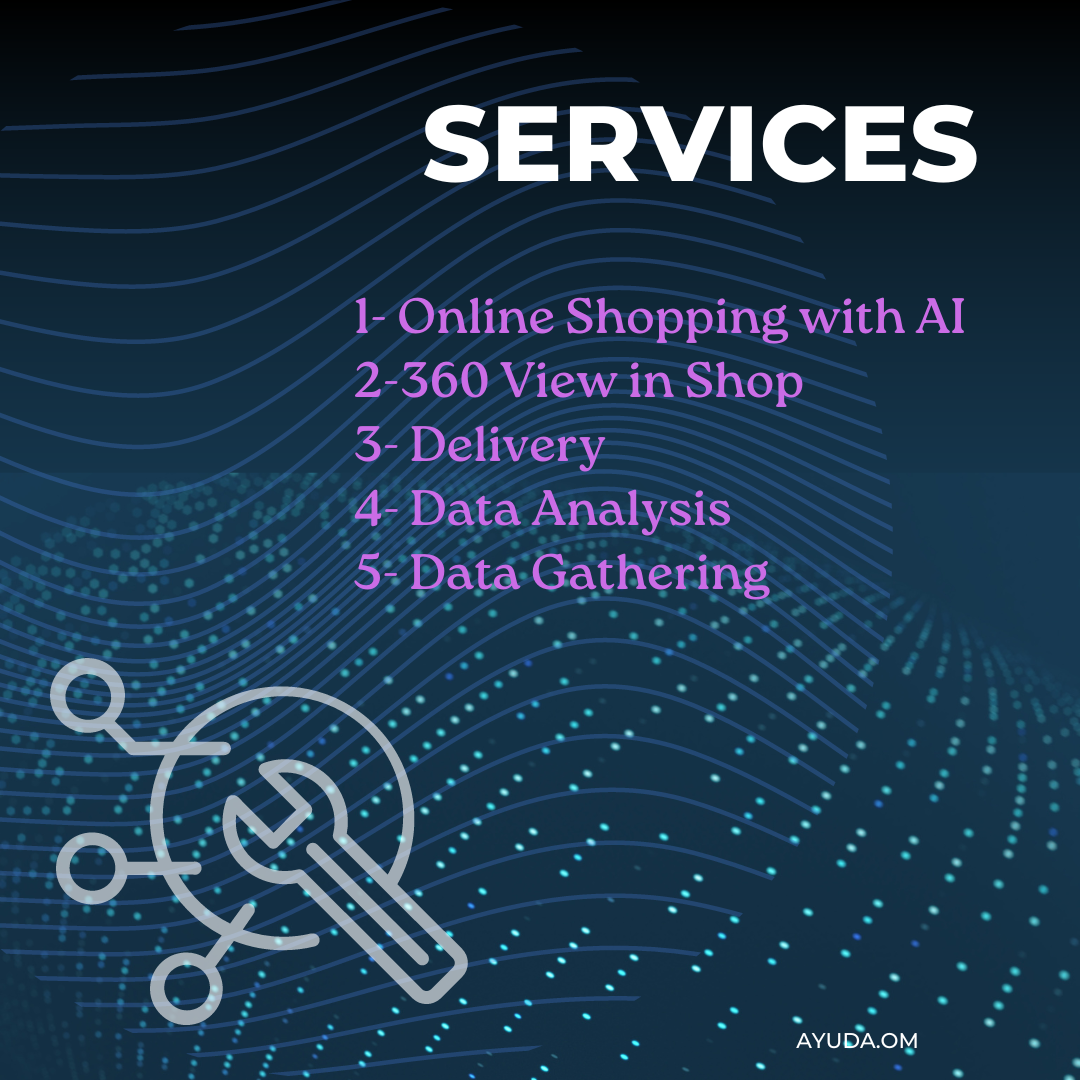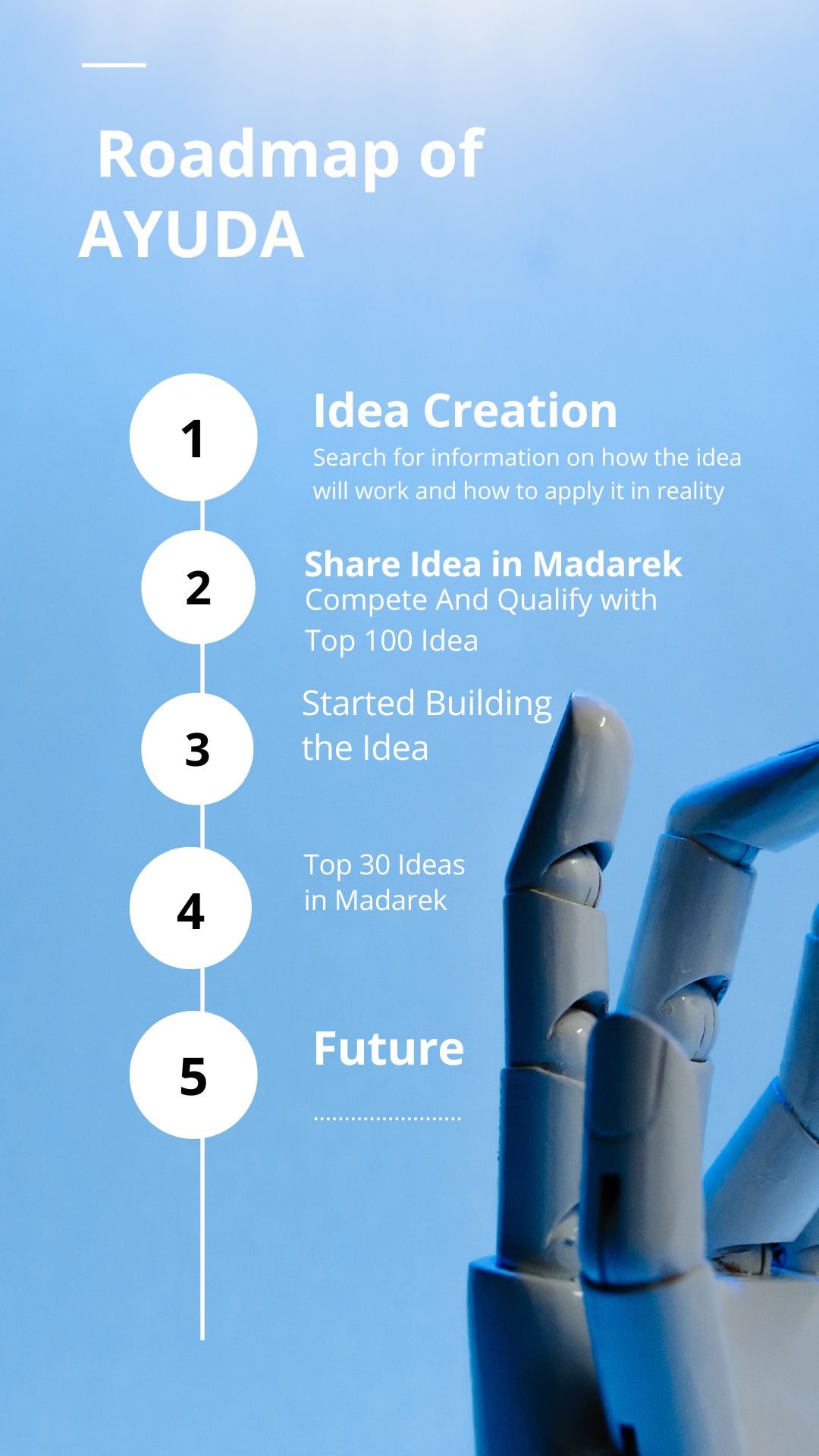Idea Description
AYUDA
AYUDA platform is a type of e-commerce that uses artificial intelligence (AI) and machine learning algorithms to improve the shopping experience for customers. AI shopping systems analyze data on customer behavior, preferences, and purchases to provide personalized recommendations and targeted promotions. These systems can also automate tasks such as inventory management, pricing, and customer support, which can improve efficiency Ai and reduce costs for retailers. AI shopping can take many forms, such as chatbots with AI, virtual assistants, recommendation engines, and predictive analytics. Overall, AI shopping aims to provide a more personalized and efficient shopping experience for customers while helping retailers to optimize their operations and increase sales Explain.
SERVICES
Here are explanations for the mentioned features of the AYUDA platform:
- Online Shopping: AYUDA provides a user-friendly e-commerce platform where customers can browse and purchase products from various retailers. The AI-driven personalization ensures a tailored shopping experience, catering to individual preferences and needs.
- 360 View in Shop: AYUDA enhances the online shopping experience by offering 360-degree product views, allowing customers to explore items in greater detail. This feature helps bridge the gap between physical and online shopping, enabling users to make more informed purchase decisions.
- Delivery: AYUDA's platform streamlines the order implementing and delivery process by integrating with logistics partners and optimizing shipping routes. This ensures efficient and timely delivery of products to customers, enhancing their overall satisfaction.
- Data Analysis: AYUDA's AI algorithms analyze wide amounts of data generated through customer interactions and purchases on the platform. This data analysis provides valuable insights into customer behavior, preferences, and trends, enabling retailers to make better-informed business decisions, optimize marketing strategies, and refine product offerings.
- Data Gathering: AYUDA continuously gathers data on customer interactions, preferences, and purchases to improve the AI-driven personalization and efficiency of the platform. By collecting and processing this data, AYUDA can better understand user needs, tailor recommendations, and enhance the overall shopping experience for customers
TARGET
Target market for AYUDA:
- Tech users: People who enjoy technology in shopping.
- Busy shoppers: Those who need quick and easy shopping.
- Deal seekers: Customers looking for discounts and offers.
- Local businesses: Companies wanting to grow online.
Why this market is a good fit for AYUDA:
- Online shopping growth: AYUDA taps into the rising e-commerce trend in Oman.
- Personalized experience: AYUDA uses AI to customize shopping for users.
- Convenience: AYUDA saves time for busy shoppers.
- Local business support: AYUDA helps smaller companies compete online.
BUSINESS MODEL
|
Step |
Process |
|---|---|
|
Onboarding |
Retailers sign up for the platform, choosing a subscription plan and agreeing to commission fees for sales. |
|
Integration |
Retailers integrate their product listings, while AYUDA gathers data for AI personalization and insights. |
|
Promotion |
Retailers can opt for paid advertising and promoted listings to increase their products' visibility on the platform. |
|
Sales |
Customers browse and purchase products; AYUDA's AI provides personalized recommendations and seamless user experience. |
|
Commission |
AYUDA charges a percentage fee from retailers for each transaction made through the platform. |
|
Delivery |
Retailers can use AYUDA's value-added services like logistics support to streamline the order fulfillment process. |
|
Data Analysis |
Retailers can access data insights and analytics tools to make informed decisions and improve their sales strategies. |
|
Retention |
AYUDA offers customer support, continuous platform improvements, and loyalty programs to retain users and retailers. |
This table outlines the steps involved in running AYUDA's business using its hybrid business model, from onboarding retailers to retaining customers and ensuring a seamless experience.
Potential Return on Investment
Calculating the potential Return on Investment (ROI) for AYUDA requires information on the initial investment, operating costs, and projected revenue.
Initial investment: Determine the upfront costs for developing and launching AYUDA's platform, including technology development, website and app design, server infrastructure, and legal expenses.
- Operating costs: Estimate ongoing expenses, such as marketing, customer support, AI technology maintenance and updates, salaries, and office expenses.
- Projected revenue: Estimate the revenue generated from different streams, including commissions, subscription fees, advertising revenue, and fees for value-added services and data insights.
- Growth rate: Consider the expected growth rate of AYUDA's user base, number of retailers, and average transaction value. This will help you project future revenue and calculate potential ROI over a specific time period.
To calculate the ROI, use the following formula:
Net ROI = (Net Profit / Total Investment) * 100
Profit = Total Revenue - Total Expenses
potential ROI for AYUDA will depend on various factors such as market conditions, competition, and the effectiveness of its marketing and operational strategies. To obtain a more accurate ROI estimate, consider conducting a thorough market analysis and financial projections based on AYUDA's unique situation.
MARKETING STRATGIES
effectively market the AYUDA platform and attract customers and retailers, consider implementing the following marketing strategies:
- Brand positioning: Clearly define AYUDA's unique selling proposition, focusing on the AI-driven personalization and convenience it offers to both customers and retailers.
- Content marketing: Develop engaging, informative, and valuable content for our target audience. This may include blog posts, articles, videos, and infographics that demonstrate the benefits of using AYUDA, showcase its features, and offer helpful tips for online shopping.
- Social media marketing: Create and maintain an active presence on popular social media platforms in Oman. Share content, engage with users, and use targeted advertising to reach potential customers and retailers.
- Influencer partnerships: Collaborate with local influencers who have a strong following among our target audience. Encourage them to review or promote AYUDA, leveraging their credibility and reach to generate interest and trust in our platform.
- Email marketing: Build a subscriber list and send regular newsletters with personalized content, promotions, and updates on new features. Use email automation tools to segment our audience and tailor our messaging based on their preferences and behaviors.
- Search engine optimization (SEO): Optimize our website and content for search engines to increase organic visibility and attract potential customers and retailers who are searching for online shopping solutions.
- Referral and loyalty programs: Encourage users to refer friends and family to the AYUDA platform by offering incentives, such as discounts or exclusive promotions. Similarly, create a loyalty program to reward repeat customers and strengthen their relationship with our platform.
- Local events and sponsorships: Participate in or sponsor local events, trade shows, and conferences related to e-commerce and retail to gain exposure and network with potential retailers and partners.
- Public relations (PR): Develop relationships with media outlets and journalists to secure coverage in local news, industry publications, and blogs. Share news about AYUDA's milestones, achievements, and partnerships to generate buzz and increase brand awareness.
- Continuous improvement: Gather feedback from users and retailers to identify areas of improvement and refine our marketing strategy. Monitor our marketing efforts' performance and make data-driven decisions to optimize our approach.
By implementing these marketing strategies, AYUDA can build brand awareness, attract customers and retailers, and position itself as a leading AI-driven e-commerce platform in Oman.
Challenges The Idea is Addressing
AYUDA Challenges may face several challenges during its development, launch, and growth phases. Some of these challenges include: 1. Competition: AYUDA will likely face competition from established e-commerce platforms and other emerging AI-driven solutions. Standing out in a competitive market and attracting both customers and retailers can be challenging. 2. Technological complexity: Developing and maintaining a reliable and efficient AI-driven platform requires significant technical expertise, continuous updates, and improvements to ensure the platform remains competitive and meets user expectations. 3. Data privacy and security: Handling user data, particularly personal information and payment details, requires strict adherence to data protection regulations and robust security measures to prevent breaches and maintain user trust. 4. User adoption: Convincing users to try a new platform can be difficult, especially if they are already accustomed to using other e-commerce platforms. AYUDA must offer unique features and benefits to attract and retain users. 5. Scaling: As AYUDA grows, it will need to scale its infrastructure, operations, and customer support to accommodate an increasing number of users and transactions while maintaining a seamless user experience. 6. Marketing and branding: Building brand awareness and a strong reputation in the market is essential for AYUDA's success. Developing an effective marketing strategy that resonates with the target audience can be challenging and resource-intensive. 7. Regulatory compliance: AYUDA must comply with e-commerce regulations, consumer protection laws, and international trade policies in the regions it operates, which can be complex and subject to change. 8. Logistics and fulfillment: Partnering with reliable logistics providers or managing in-house delivery services can be challenging, particularly when it comes to ensuring timely and accurate order fulfillment. By addressing these challenges proactively and adapting to market conditions, AYUDA can increase its chances of success in the competitive e-commerce landscape.
Benefits of Idea Implementation
AYUDA BENEFITS • Personalization: By analyzing customer behavior, preferences, and purchase history, AYUDA can offer highly personalized recommendations to each user. This tailored shopping experience can lead to increased customer satisfaction, higher conversion rates, and stronger customer loyalty. • Enhanced customer support: The platform's AI-powered chatbots and virtual assistants can provide instant and accurate responses to customer inquiries, ensuring that shoppers receive real-time assistance throughout their journey. This can help resolve issues quickly, improve overall customer satisfaction, and reduce the need for human intervention in customer support. • Streamlined operations: AI-driven automation can handle a range of tasks, from order processing and inventory management to payment processing and logistics. By automating these processes, the AYUDA platform can help retailers reduce operational costs, minimize human errors, and improve overall efficiency. • Data-driven insights: The platform's machine learning algorithms can analyze vast amounts of data to uncover patterns and trends, providing retailers with valuable insights into customer behavior and preferences. This information can be used to optimize marketing strategies, refine product offerings, and make better-informed business decisions. Dynamic pricing and promotions: AYUDA's predictive analytics capabilities can enable retailers to implement dynamic pricing strategies and targeted promotions based on customer behavior and market trends. This can help maximize revenue, improve inventory management, and create a more competitive edge in the e-commerce landscape.
Proposed Number of Team Members
3
Team Members

.png)



.png)



 Winning Idea
Winning Idea 














